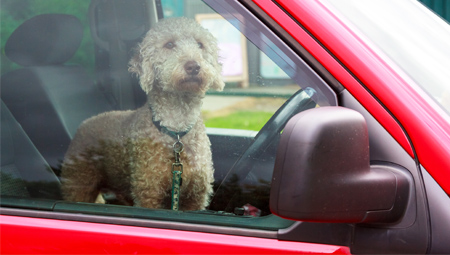Prevent pet fatalities
Each summer our agencies receive hundreds of emergency calls to rescue dogs whose lives are endangered because they are left in hot cars,
says Sean Hogan, BCSPCA Kelowna Branch manager. Many well-meaning guardians leave their pets in parked vehicles while they run errands, thinking they will be safe for a short period. Tragically, in hot weather their pets can suffer serious heatstroke and die in a matter of minutes.
We make it a priority to respond as quickly as possible, but we would rather see the problem addressed through education and prevention before an animal is put in a potentially fatal situation,
says Kelowna RCMP Cpl. Jesse O’Donaghey. Each time an officer is dispatched to rescue an animal in a parked car, it stretches resources required for other emergency calls.

The temperature in a parked car, even in the shade with windows partly open, can rapidly reach a level that will seriously harm or even kill a pet. In just minutes, the temperature in a parked car can climb to well over 38 degrees Celsius (100 degrees Fahrenheit). Dogs have no sweat glands, so they cool themselves by panting and by releasing heat through their paws.
On summer days the hot air and upholstery in a vehicle can make it impossible for pets to cool themselves. Dogs can withstand high temperatures for only a very short time – usually just 15 to 20 minutes - before suffering irreparable internal organ and brain damage or death.
If you’re used to letting your pets accompany you on errands, you might feel guilty leaving them behind on hot summer days. But they will be much happier – and safer – at home, with shade and plenty of fresh, cool water,
Hogan says. If you must travel with your pets, keep them cool.
What to do if you see a dog in distress in a parked vehicle:
Note the license plate and vehicle information. Ask managers of nearby businesses to page the owner to return to their vehicle immediately.
Call to report the hot dog in car situation if no owner is found, or when animal is suffering symptoms of heatstroke. During daytime, 9-5pm, call your local SPCA and in an emergency, call 9-1-1 for RCMP attendance.
Note: It is illegal for members of the public to break a window to access the vehicle themselves; Only RCMP and Special Provincial Constables of the BC SPCA can lawfully enter a vehicle. SPCA branch staff and volunteers cannot enter vehicles.
Keep emergency supplies in your car, such as bottled water, a small bowl, and a towel that can be soaked in water. This can help hydrate an animal (if a window has been left open) while you wait for emergency response. A battery-powered fan from a dollar store can also be handy to circulate air.
Be an advocate! Help spread the word that pets and hot vehicles are a fatal mix.
Symptoms of heatstroke in pets:
- Exaggerated panting (or the sudden stopping of panting)
- Rapid or erratic pulse
- Salivation
- Anxious or staring expression
- Weakness and muscle tremors
- Lack of coordination, convulsions
- Vomiting
- Collapse
If your pet shows symptoms of heatstroke
- Immediately move the animal to a cool, shady place.
- Wet the dog with cool water.
- Fan vigorously to promote evaporation. This will cool the blood, which reduces the animal’s core temperature.
- Do not apply ice. This constricts blood flow, which will inhibit cooling.
- Allow the animal to drink some cool water (or to lick ice cream if no water is available).
- Take the animal to a veterinarian as soon as possible for further treatment.
Related links
- Visit the BC SPCA website for more information on what you can do to help keep dogs safe when the weather warms up.
- Visit the ICBC website for more safety tips on riding in cars with pets.
- Date modified: